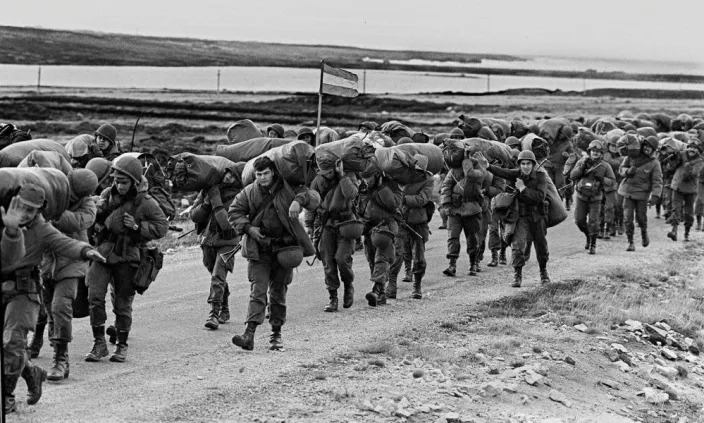CovOps

 Location : Ether-Sphere Location : Ether-Sphere
Job/hobbies : Irrationality Exterminator
Humor : Über Serious
 |  Subject: Argentinian Falklands veterans mark ‘day of sadness’ over torture they endured Subject: Argentinian Falklands veterans mark ‘day of sadness’ over torture they endured  Mon Apr 04, 2022 1:29 am Mon Apr 04, 2022 1:29 am | |
| Many Argentinians will this Saturday celebrate the 40th anniversary of the day their country’s troops landed on the Falklands, the South Atlantic islands that Argentina has long claimed as its own.

Related: How an Argentinian man learned his ‘father’ may have killed his real parents
But for Eduardo Ortuondo, 2 April will always be “a day of sadness”, due to the torture he and about 200 fellow veterans endured at the hands of their Argentinian commanders during the 1982 war.
Within days of that triumphant first landing at Port Stanley, capital of the islands known in Argentina as Las Malvinas, Argentinian soldiers were being subjected to the kind of cruelty previously reserved for political prisoners back home.
Troops were starved, staked to the ground or made to stand in deep pools of freezing water for hours. Not a few died at the hands of their own officers, say the veterans.
Veterans like Ortuondo have been seeking justice for years, and they have now launched a fresh push for Argentina’s supreme court to review their cases.
“Many of us went to fight as volunteers, but not to go through that kind of hell. Our primary enemies – apart from the cold and the British troops – turned out to be our own superiors,” said Ortuondo, now 60.
Soldiers like Ortuondo at first believed that their cases were exceptions but soon realized that the brutality was systematic – perhaps unsurprising in a military dictatorship also responsible for the “disappearance” of about 30,000 young people in death camps across Argentina.
“To us it was the continuation of the torture that was already being practised by a brutal dictatorship against civilians on the mainland,” said the veteran, who endured various incidents of torture.
The generals claimed they were waging a third world war against young communists who threatened to convert Argentina into another Cuba – despite the fact that Argentina’s armed insurgents had been largely defeated by the civilian governments of President Juan Perón and his wife and successor, Isabel Martínez.
“We knew we were living under a de facto regime, and that Argentina’s military abused young people like ourselves, barely out of high school,” Ortuondo said. “But to all of us the Malvinas were, are and will be Argentinian – and we went to fight full of patriotic pride. We knew that they were capable of all kind of barbarities, but we thought that they would look after their own troops.”
Ortuondo and many like him found just the opposite.
Once on the islands officers and NCOs hoarded rations and stole soldiers’ food. Ortuondo did not receive a single one of dozens of food packages sent by his family.
Once, a superior officer caught Ortuondo licking an empty jar of marmalade. As punishment he was made to stand in a deep freezing pool of water in the inclement South Atlantic weather.
“Water on the islands seeps up from the ground. They put four stakes in the earth and tied my hands and feet to them. They used very thin rope, which is excruciatingly painful. In some other cases they used wire to increase the suffering even further. So there I was, staked to the ground, with the snow falling on me, the cold worsening my pain. Then a sergeant stood on the inner arch of one of my feet and started jumping from one foot to the other.”
After the end of the war, returning veterans were secretly made to sign non-disclosure documents, pledging never to talk about what they had seen or endured on the islands.
Meanwhile, Argentinian society turned its back on the veterans, because of their perceived association with the dictatorship. It took many years, and the suicides of about a thousand veterans, before they could speak about their plight.
Veterans like Ortuondo have been seeking justice for 15 years, ever since they opened their first case against a former superior in 2007.
Despite some advances, including legally proving the existence of the crimes committed against them, in 2015 Argentina’s supreme court invoked the statute of limitations to overturn a case against a non-commissioned officer accused of torture on the islands. The ruling slammed a door in the face of the veterans seeking justice for the tortures they endured.
The veterans have since appealed to the Inter-American Commission on Human Rights, which has organized talks between the government and the veterans to find a solution. But the veterans are insisting that the torture they endured should be declared a human rights crime, and so not bound by the statute of limitations.
Earlier this month a group of veterans, including Ortuondo, marched on the supreme court demanding a review of their case.
“I don’t know why the supreme court is so scared. Maybe they’re scared of the military, that they might return to power, or maybe the supreme court is simply playing for time hoping we’ll go away. But it won’t work, because the older we get, the more passionate we become and the more anxious we are to see our case brought to justice.”
.https://news.yahoo.com/argentinian-falklands-veterans-mark-day-121320395.html

_________________
Anarcho-Capitalist, AnCaps Forum, Ancapolis, OZschwitz Contraband
“The state calls its own violence law, but that of the individual, crime.”-- Max Stirner
"Remember: Evil exists because good men don't kill the government officials committing it." -- Kurt Hofmann |
|

